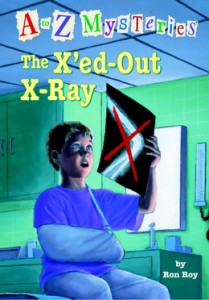Sunday, 05 August 2012
Owen and I are currently reading Ron Roy’s The X’ed-Out X-Ray. This strangely titled  book is named what it is because it’s part of a series of books, the A to Z Mysteries series.
book is named what it is because it’s part of a series of books, the A to Z Mysteries series.
I’m always curious about what authors do for the letter X. In most adult books, it’s a non-issue, but it comes up quite regularly in kids books. There are tons of A to Z books. Often, I think the choice for the X word is a cop-out. For examples, we have the book V is for Viking: A Minnesota Alphabet. As the title implies, the book donates one or two pages to each letter of the alphabet featuring something relating to Minnesota. V, as you probably guess, is for Viking. W is for Walleye. Guess what X is for? It’s for “X marks the spot” on the map where Laura Ingalls used to live. Totally cop-out.
Slightly better is Gone Wild, an alphabet book of endangered animals. For the letter X – and only the letter X – the author flips his otherwise consistent practice of alphebetizing the animals by common name first, then scientific name.
A weird case is Dr. Seuss’s ABC. When the good doctor arrives at the 24th letter, he doesn’t even bother to list any words that begin with X; he just lists off a few words that contain the long-suffering consonant: ax, extra, and fox are among his choices. This is the only letter for which he does this. It’s weird because, come on: this is Dr. Seuss! He can just make up any damn word he pleases. And he does – two letters letter, he offers up a zizzer-zazzer-zuzz as an example of something that begins with Z.
So, part of me appreciates what Ron Roy did here: he managed to remain consistent, which is more than most authors can say. But part of me thinks “X’ed-out” is a really stupid word. But maybe I shouldn’t be so hard on the guy. After all, he didn’t make up the word; it’s even been used in other book titles (albeit without the hyphen).
See?
Anyway, my son must’ve noticed my moderate revulsion. Today he asked me to names ten words that begin with the letter X. And…it’s really hard. Especially because he specifically told me I couldn’t use x-ray. My nevxt selection was X-mas, but my wife was nearby, and she said that didn’t count. I don’t know who made her senior editor of the Oxford English Dictionary, but I attempted to muddle through with my son’s and wife’s restrictions.
Here’s what I came up with:
-Xylophone
-Xenon
-Xenophobia
-Xerxes
-Xerox
-Xeroxed
-Xeroxing
…Yeah, total cop-out at the end there.
Monday, 06 August 2012
I met with my advisor this afternoon as part of my summer internship program. Upon arriving at his office, I complimented him on his glasses. They looked like this:
I guess these things are all the rage now. Or should I say, again? Two co-workers have recently updated their eyewear, and they both opted for the clunky Wayfarers, too. One’s a guy and one’s a lady, so evidently this fashion statement is not held back by gender restrictions in the same way, say, lipstick is.
My advisor used to have thin-wired, nearly circular frames, and I took the opportunity to remark that Buddy Holly must be winning out over John Lennon in the optical fashion world right now.
Buddy Holly: John Lennon:
Tuesday, 07 August 2012
Here’s an interesting question: Could the upcoming US Presidential election be a tie?
Well, of course it could be a tie, just like there could be an all-powerful god in te sky, but we all know the real answer, right?
Not so fast argues THIS FASCINATING ARTICLE. Of course, the author admits this is highly unlikely, but it is more likely than it has been during the past several elections. I should mention he’s referring to electoral votes – not actual votes. Remember back in 2000 when there was a near tie between that one wooden detatched automaton and that other wooden detatched automaton? Yeah, see that was just a tie in the popular vote, and it was, strictly speaking, a tie anyway. Regardless, back then the electoral vote was never an issue: as soon as Bush Jr. was declared Florida’s winner, it was a no-brainer who won out in the electoral department.
No, what this article is discussing is the possibility of a tie on the electoral level which, to me, seems like more of a mess than what happened in 2000. The author admits the supreme court would likely get involved, thus speeding up the process and getting the job done, but also raising all sorts of questions about the constituationality of their power…again, like what happened in 2000.
Anyway, just go read it.

![xed-out[1]](http://zimmerscope.com/Verbisaurus/wp-content/uploads/2012/08/xed-out11-225x300.jpg)
![img-thing[1]](http://zimmerscope.com/Verbisaurus/wp-content/uploads/2012/08/img-thing1.jpg)
![Foto_Buddy_Holly[1]](http://zimmerscope.com/Verbisaurus/wp-content/uploads/2012/08/Foto_Buddy_Holly11-206x300.jpg)
![jglasses2[1]](http://zimmerscope.com/Verbisaurus/wp-content/uploads/2012/08/jglasses21-246x300.jpg)